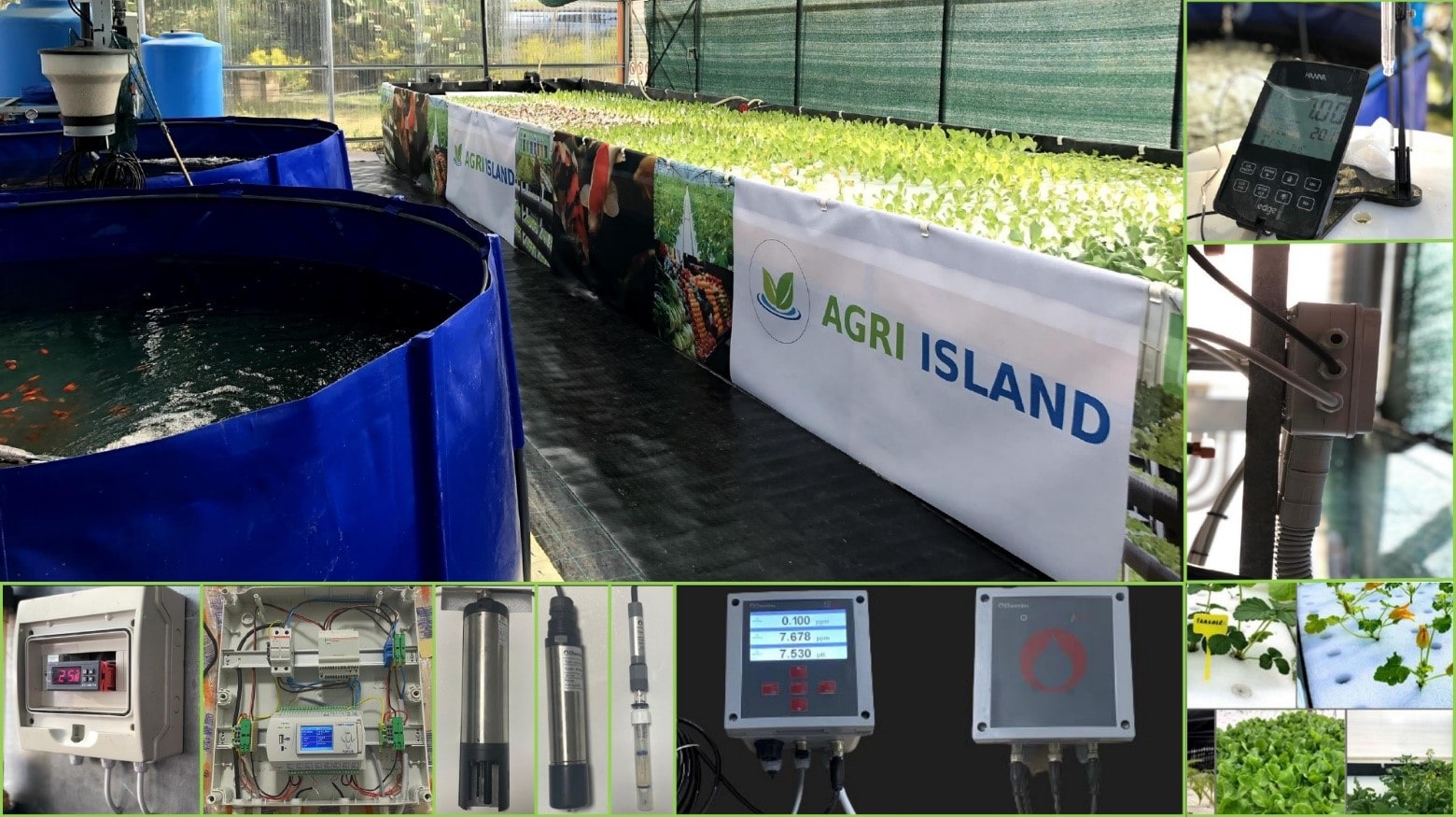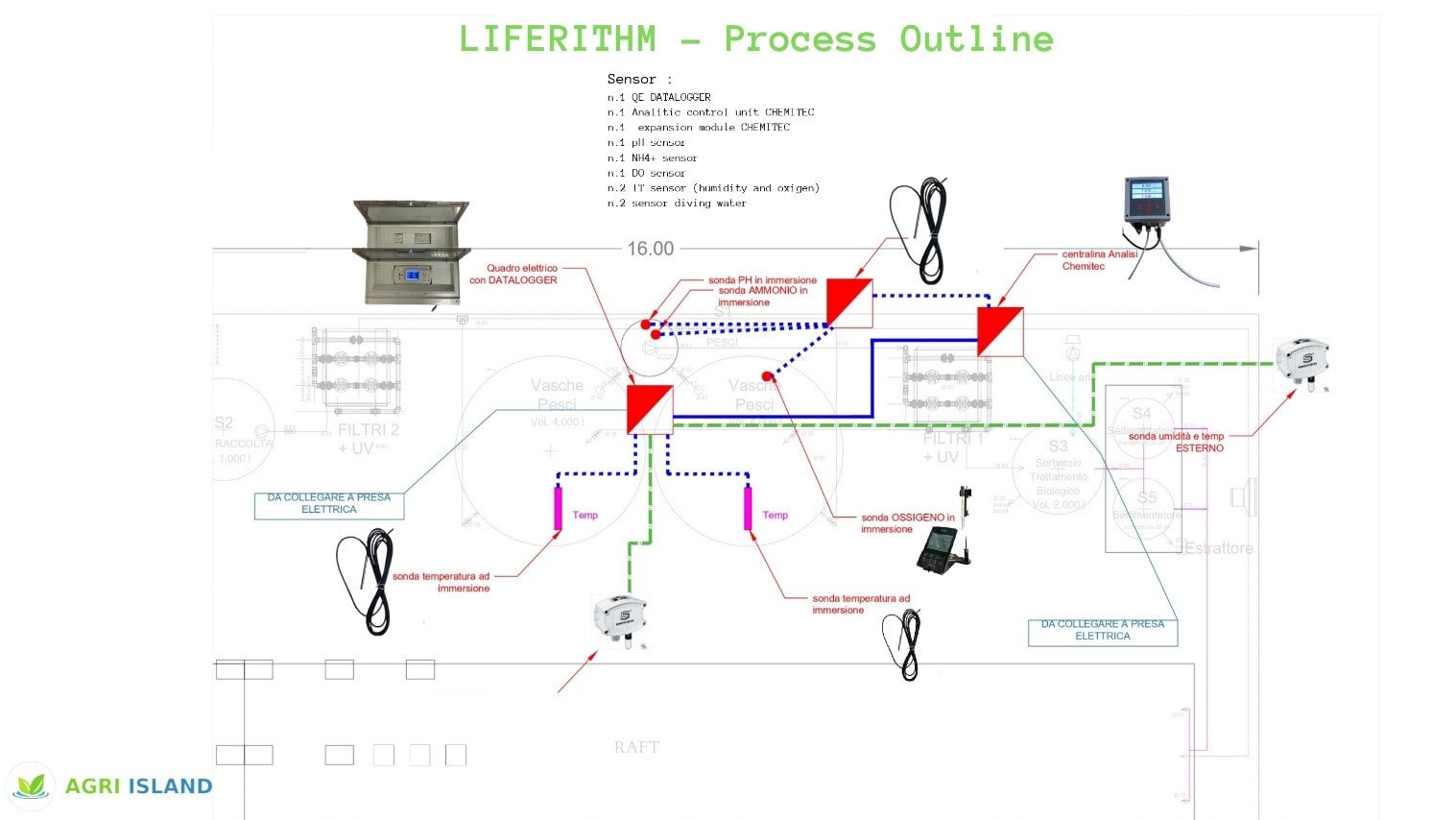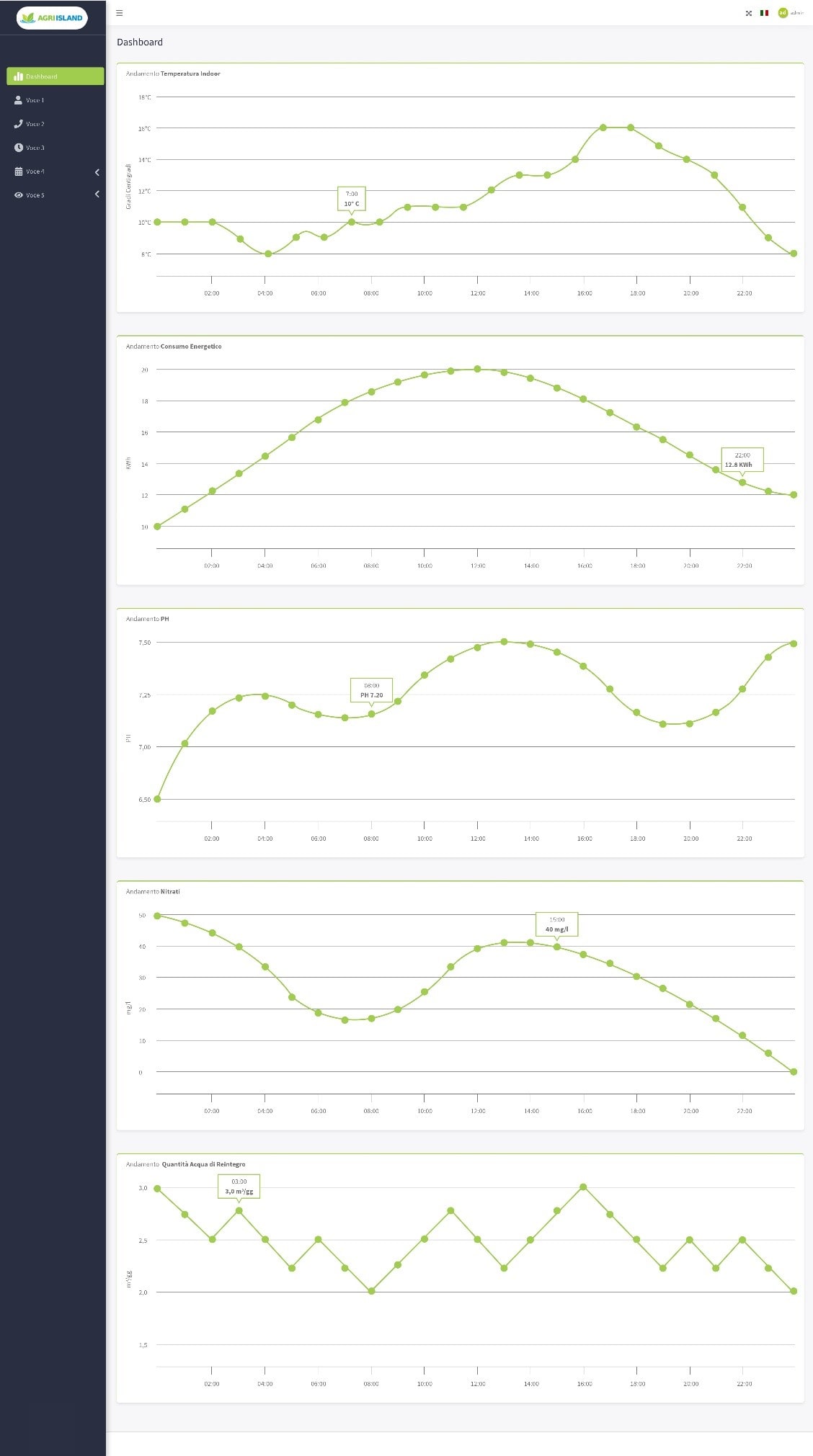Experiments
LIFERITHM
Italy
![]() DIH CONFAPI
DIH CONFAPI
Experiment objective
The LIFERITHM experiment aims at developing a predictive algorithm to be applied to AGRI ISLAND’s aquaponic systems in order to improve both the smart farm production performances and the quality of the food products. The experiment will directly affect the capacity of AGRI ISLAND to run its production systems at their best, significantly improving aquaponic technology successfully used by the company since 2017. AGRI ISLAND’s systems are smart farm producing food (vegetables and animal proteins) and clean water. Within the smart farm, there are three physically separated systems (animals, bacteria and plants) coexisting in a biological equilibrium and connected by a continuous cycle of water that purifies and feeds them constantly. The maintenance over time of favourable living conditions for the three components of the ecosystem guarantees high production performances and superior-quality food products with a high nutraceutical level.
At the state of the art, AGRI ISLAND aquaponic technology does not require the use of pesticides as well as the use of mechanical vehicles usually employed for traditional agriculture. By optimising this method of cultivation, AGRI ISLAND, aims to reduce waste related to agricultural production, addressing environmental issues such as food loss and waste, water scarcity and climate change.
Enabling the predictive feature, AGRI ISLAND will be able to establish a series of process parameters to achieve the best results in terms of production. LIFERITHM – “the algorithm of life” – has one job: to study and manage the parameters within the Gaussian function, maintaining them at their best levels and predicting future trends, to assure optimal performances. The algorithm will be able to support the aquaponic system, keeping it in that “high balance” of production to ensure the ideal growth of plants and fish.
The LIFERITHM experiment uses Machine Learning and Artificial Intelligence to collect data from daily observations of agricultural and fish species, while processing the parameters collected from the observations to select the best performing cases according to specific characteristics (colour of leaves, fruit and roots, growth rate of plants, number of fruits per plant, but also analysis of the swimming paths of fish, their colour, identification of underfed individuals, etc.). The result is the creation of a production model with excellent system properties.

An overview image of the production system.
Challenges
- Challenge 1: Population Growth. The world population will reach 9.3 billion by 2050, hence imbibing the demand for more food to feed the human population. Currently, there are 60 million more people than in 2014 who remain undernourished globally. FAO points to aquaponic cultivation systems as the most efficient currently existing and the only ones capable of providing food sustainability for future generations. AGRI ISLAND smart farms combines aquaponic technology with high-tech systems in order to guarantee high production performances. Plants grows twice as fast as if compared to traditional agriculture.
- Challenge 2: Climate change. Traditional agriculture is the principal responsible for CO2 Aquaponic cultivation on the other hand has a very low ecological footprint.
- Challenge 3: Competition for natural resources. Water scarcity, water pollution and the uncontrolled exploitation of the soil are the main issues related to agriculture. Compared to traditional cultivation methods, AGRI ISLAND aquaponic systems reduce water consumption by 90%, since only the water evaporated and used by the plants needs to be replenished. Systems also allow a smarter use of cultivation space: more plants can be grown in less space because the roots are not competing with each other to absorb nutrients.
Challenge 4: Optimising production performances and generating superior quality food. To run the system at is best, AGRI ISLAND need to control the system water pH, aeration and filtration technologies; acceptable nutrient ranges, pairing of plant and fish species, microbial populations, nitrogen levels, quantity and type of feed. Finding the right balance between all the variables represent the main challenge for the algorithm in order to optimize the cultivation.
Implementation of the Solution
The LIFERITHM experiment aims at boosting AGRI ISLAND production systems’ performances, implementing the predictive algorithm in order to deliver a fine-tuned, high productive system. All plants and mechanic components are linked to sensors collecting data that are being stored to build a database useful for the development of the LIFERITHM algorithm.
The experiment will take place inside the R&D dedicated greenhouse located in Tarquinia, Italy. The idea behind the experiment consists of dedicating the R&D system to testing, modelling and finally delivering the predictive algorithm, using data collected inside the system.
We will design the LIFERITHM experiment through the following steps:
- Data Modelling: the process that transforms unstructured data into structured ones through: i) data setting; ii) data qualification; iii) data structuring;
- Models’ comparison: comparing the different application models already developed and tested within the AGRI ISLAND R&D pilot system.
- Algorithm design: selection of the best AI models.
- Proof of Concept: testing the algorithm.
LIFERITHM will complete the “AI AQUAPONIC APPLICATION”, the integrated system already developed by AGRI ISLAND that allows data collection and data storage. Adding the predictive feature, object of the present experiment, the system will be able to evaluate the best combination of plants and fish, to predict the yield of the crops produced in the plant, and to know the performances of the species grown and/or bred during the process. This solution makes it possible to calculate a series of process parameters to achieve the best results in terms of production, food quality and the overall system performance. The result is the creation of a production model with excellent system properties.

Process outline image of the production system with details of the installed sensors.

Image showing the dashboard collecting relevant KPIs and trends.
Dissemination
LIFERITHM experiment will be promoted within Confapi and Confapi DIH network as well as AGRI ISLAND network. It will be included in both Confapi website and AGRI ISLAND’s one. In particular, a presentation of LIFERITHM experiment will be entered in the specific page for Confapi DIH and its projects: https://www.confapi.org/it/digital-innovation-hub-confapi.html; as well as AGRI ISLAND website: https://agriisland.it/.
It will also be promoted on the Confapi newsletter which is distributed to Confapi network and to its stakeholders.
Presentation of the project will be disseminated during Confapi board of Directors meetings in order to inform about the activities and the results and to boost other companies to work with Confapi DIH. It will be also presented to Confapi national board to encourage future strategies basing on DIH activities.
Furthermore, the project will be promoted on social media, the Linkedin page of AGRI ISLAND and Confapi’s Facebook and LinkedIn pages.
The Dissemination activities also includes participation in industry events, like fairs and congresses about smart farming and Artificial Intelligence applied to aquaponics.
AGRI ISLAND and CONFAPI DIH have decided to give preference to events close to the site of the experiment in order to best introduce the products and technology used by the aquaponics farm to the locals. The objective is to present the LIFERITHM and aquaponic smart farm to improve the awareness behind the mass production of agricultural products and promote a more sustainable methodology compliant with the SDGs 2030 (Sustainable Development Goals 2030).
We have identified two main events that best suit LIFERITHM experiment concept: (i) Agricultural Machinery Exhibition in Tarquinia (ii) Maker Fair Rome 2023:
- Agricultural Machinery Exhibition in Tarquinia: is a reference event for central Italy regarding agriculture and the world connected with it. It has an exhibition area of more than 50.000 mq2 and host more than 250 industries. This event takes place right next to the site of AGRI ISLAND smart farm and it’s held in April. We have already got in touch with the event managers of the exhibition and we are waiting for the details.
- Maker Fair Rome 2023: Maker Faire is the Greatest Show (and Tell) on Earth—a family-friendly festival of invention, creativity and resourcefulness, and a celebration of the Maker movement. It is an all-ages gathering of tech enthusiasts, crafters, educators, tinkerers, hobbyists, engineers, science clubs, authors, artists, students, and commercial exhibitors. The Maker Fait is held between October and November. We have already got in touch with the event managers of the event and we are waiting for the details.
In addition, to mention numbers which can be reached by the dissemination activities: Confapi network is represented by 116.000 associated enterprises. Confapi has 63 local associations and it is also a founding member of the European Entrepreneurs CEA-PME, a Brussels-based business federation, accounts for approximately 20 European associations of SMEs, 1.5 million SMEs and around 15 million employees in Europe and Turkey. Moreover, CONFAPI is a member of INSME, the international network for SMEs that works under the auspices of the OECD (Organization for Economic Co-operation and Development) and can count on the support of 65 Members from 35 different countries around the globe: 38 from Europe, 12 from Asia, 7 from North America, 4 from South America, and 4 from Africa.
